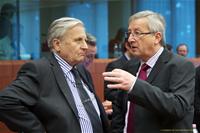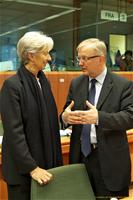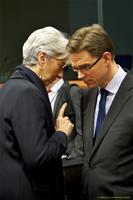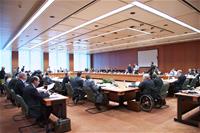The debt crisis as a Brussels’ croissant
Ralitsa Kovacheva, March 16, 2011
 It is difficult to perceive the dept crisis as a towering tsunami while having breakfast of fresh croissants accompanied by 15 types of cheese and fragrant coffee. These were my thoughts while I was waiting for my next interlocutor to discuss the latest decisions of European politicians concerning the recovery of the euro area from the crisis.
It is difficult to perceive the dept crisis as a towering tsunami while having breakfast of fresh croissants accompanied by 15 types of cheese and fragrant coffee. These were my thoughts while I was waiting for my next interlocutor to discuss the latest decisions of European politicians concerning the recovery of the euro area from the crisis.
The news from the latest Eurogroup meeting on Monday (14 March) is that the euro area ministers have not succeed in agreeing on the ways to increase the effective lending capacity of the European Financial Stability Facility (EFSF). As you well know, at their meeting on 11 March the leaders of the eurozone agreed in principle to reach the full capacity of the EFSF of 440 billion euro, but left the financial ministers to decide exactly how to do it. As euinside has already written, although in theory these resources are available, currently the fund  can effectively operate with only about 250 billion euro. The reason is that only six counties in the eurozone have a triple A credit rating and that – in order to guarantee the same rating for its instruments – the EFSF has to secure a large cash buffer.
can effectively operate with only about 250 billion euro. The reason is that only six counties in the eurozone have a triple A credit rating and that – in order to guarantee the same rating for its instruments – the EFSF has to secure a large cash buffer.
There are two options to increase the fund's lending capacity – through bigger state guarantees or, less likely, through cash contributions. Eurogroup President Jean-Claude Juncker commented that he personally expected preference to be given to the state guarantees option. The issue is, however, left for the next Eurogroup meeting – the last before the European Council on 24 and 25 March, when the leaders will have to take the final decision concerning the rescue fund and its successor – the European Stability Mechanism.
Despite the common position produced by the leaders of the euro area, on the foreground now emerge such things as national specifics and inner political factors. According to The Financial Times the euro area countries were expecting participation in the fund to be allocated on the basis of a formula of the European Central Bank (ECB) that takes into account the size of each economy and the country’s population. Some of the smaller countries, as for example Estonia, expressed discontent with this method. At the same time, being engaged in preparations for the parliamentary elections that are due in two months, the Finnish government seems reluctant to increase its participation in the rescue fund because of public disapproval. The German opposition on the issue rests on similar grounds.
 European Commissioner for the Economic and Monetary Affairs Olli Rehn, who is Finnish, refused to comment on the topic, aswell as on any other topic related to the rescue fund. He advised journalists to address their questions to Mr Juncker after the Eurogroup meeting on 21 March.
European Commissioner for the Economic and Monetary Affairs Olli Rehn, who is Finnish, refused to comment on the topic, aswell as on any other topic related to the rescue fund. He advised journalists to address their questions to Mr Juncker after the Eurogroup meeting on 21 March.
The Commission is satisfied with the approval by the Financial Ministers of the legislative package on strengthening EU economic governance. This allows for the Council Presidency to start negotiations with Parliament and for the measures to be formally adopted by June. As euinside wrote in detail, the package consists of 5 proposals and a directive, two of which deal particularly with the euro area. The idea is to strengthen the Stability and Growth Pact with new and early sanctions on the one hand and, on the other, to pay more attention to the potential macroeconomic imbalances.
In Brussels, the euro area leaders' decision from 11 March to allow the rescue fund to buy up debt directly from the states and not from markets is widely commented. According to an analyst from a prestigious Brussels-based think-tank this seems completely meaningless. The right decision, the analyst explained, should be the fund to buy up debt already bought out by the ECB and to apply a haircut. With the current instruments this is not possible.
It is also unclear whether this option will be provided only for the countries that already have a rescue programme or for all potential users of the fund. My personal interpretation is that the option addresses to all potential candidates but the condition for the fund to buy up their debt bonds would be the signing of a stabilisation programme with strict conditions. The analyst, however, rebutted my interpretation with the argument that, then, there would be no difference between lending and buying of debt which again comes to prove how meaningless the idea is, obviously  accepted under German pressure. As you well know, initially Germany opposed the provision of such competences to the EFSF and when it yielded back it happened obviously in exchange for the adoption of the Competitiveness Pact disguised as Pact for the Euro.
accepted under German pressure. As you well know, initially Germany opposed the provision of such competences to the EFSF and when it yielded back it happened obviously in exchange for the adoption of the Competitiveness Pact disguised as Pact for the Euro.
After continuous lobbying in support of the idea to allow the rescue fund buy up debt from troubled euro area countries, the European Central Bank (ECB) is also not happy with the decision. Since the beginning of the crisis the ECB has bought state bonds up to the amount of 77.5 billion euro. Representatives of the bank explain that the only reason the ECB to do this is not because it wants to support the governments but because it wishes to diminish the interest pressure on the troubled peripheral economies. The governments, however, also benefit from the scheme and because of this the decision to start the programme was not unanimously supported by the ECB board last May. ECB data show that the attempts to get down the interest rates by buying-up debt from peripheral economies end up with variable success, mostly because of the different political signals and severe fluctuations of the market expectations between extreme optimism and extreme pessimism.
MEP Danuta Hubner (former European Commissioner for the Regional Development) offered another interpretation of the proposal. According to her, it practically means issuing of eurobonds because the same effect would be achieved through different means. Why do member states approve such a thing after being so much against the eurobonds, Ms Hubner asked rhetorically. As euinside wrote, the idea of launching joint bonds in the euro area was hugely supported by some Heads of State and by some MEPs. Germany, supported by France, refused even to discuss the issue at that stage because, in Ms Merkel’s words, everyone has to pay his own debts.
 And another topic that is being commented more in Brussels and less in the member states outside the euro area – is Europe starting to split into a two- speed Europe? For now, the only country that loudly and decisively opposes this tendency is Poland. The deepening of the economic cohesion in the euro area should not happen at the expense of the countries that have not yet adopted the single currency, says MEP Danuta Hubner (EPP, Poland). According to her, they ought to have the option to apply the same solutions as the euro area countries, although they are not obliged to fulfill the same criteria. Ms Hubner further added that Poland was a big country and could not afford to stay outside the decision-making process in the EU. For the smaller countries the same is not entirely valid.
And another topic that is being commented more in Brussels and less in the member states outside the euro area – is Europe starting to split into a two- speed Europe? For now, the only country that loudly and decisively opposes this tendency is Poland. The deepening of the economic cohesion in the euro area should not happen at the expense of the countries that have not yet adopted the single currency, says MEP Danuta Hubner (EPP, Poland). According to her, they ought to have the option to apply the same solutions as the euro area countries, although they are not obliged to fulfill the same criteria. Ms Hubner further added that Poland was a big country and could not afford to stay outside the decision-making process in the EU. For the smaller countries the same is not entirely valid.
Ms Hubner did not answer directly to my question whether Poland is trying to mobilise  support on this issue at least in the European Parliament or among the rest of the countries outside the euro area (the special cases such as UK and Denmark do not count here, of course). I explained that the topic was completely out of the agenda in Bulgaria. She hit back by asking what media were doing to make the topic important for the public. And, in my turn, I did not answer. But perhaps, the answer lies in her opinion about the big and the small countries – not in the sense of size or economic capacity but in terms of ambitions, goals and mentality.
support on this issue at least in the European Parliament or among the rest of the countries outside the euro area (the special cases such as UK and Denmark do not count here, of course). I explained that the topic was completely out of the agenda in Bulgaria. She hit back by asking what media were doing to make the topic important for the public. And, in my turn, I did not answer. But perhaps, the answer lies in her opinion about the big and the small countries – not in the sense of size or economic capacity but in terms of ambitions, goals and mentality.
It is almost impossible to explain the public sluggishness in Bulgaria even to someone from Poland – a country with similar past experiences. It turned out just as impossible to convince a colleague from Sweden, who complained about Stockholm being “too clean, almost sterile”, that there is no such thing as a “too clean city”. Obviously, everything depends on the point of view and on expectations.
 Angela Merkel, Emmanuel Macron | © Council of the EU
Angela Merkel, Emmanuel Macron | © Council of the EU Benoit Coeure | © Council of the EU
Benoit Coeure | © Council of the EU Pierre Moscovici | © Council of the EU
Pierre Moscovici | © Council of the EU | © European Parliament
| © European Parliament | © The Council of the European Union
| © The Council of the European Union | © European Parliament
| © European Parliament